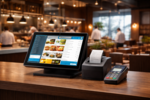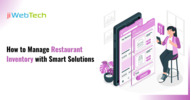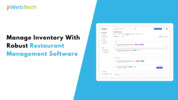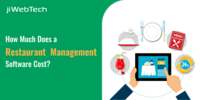- Aug 26, 2025
Share this post on:
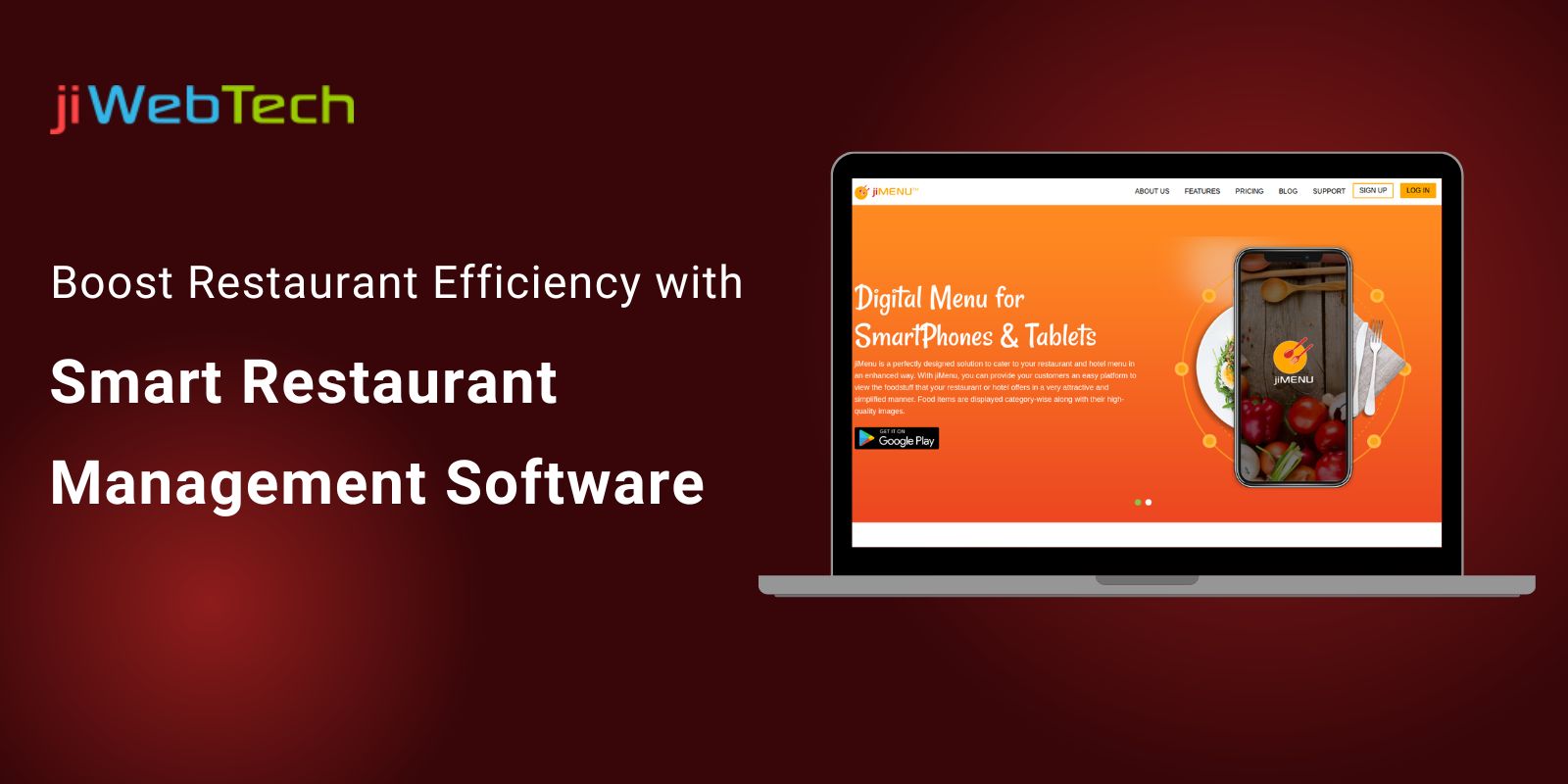
The restaurant industry is evolving at a rapid pace. With growing customer expectations, rising competition, and increased operational complexities, restaurants need advanced tools to stay ahead. Technology is now the backbone of modern food businesses, and investing in the right Restaurant Management Software has become essential to ensure efficiency, accuracy, and profitability.
At jiWebTech, we understand that running a restaurant requires seamless coordination across multiple functions, from reservations and order management to billing and inventory tracking. This is where our Smart Restaurant Management Software comes in, designed to streamline operations, reduce errors, and improve the overall customer experience.
In this blog, we will explore how advanced Restaurant Management Solutions can revolutionize the way restaurants operate, covering everything from stock control to customer service.
Key Takeaways
- Smart Restaurant Management Software streamlines operations by integrating order management, billing, and restaurant inventory management software into one platform.
- Restaurant Management Solutions improve efficiency by reducing errors, saving time, and enhancing the customer experience.
- The best restaurant software must include features like restaurant stock management software, staff scheduling, and customer loyalty programs.
- Developing smart inventory software for restaurants requires a structured process from research, design, feature integration, testing, and deployment.
- jiWebTech delivers scalable and innovative restaurant management solutions that empower restaurants to operate efficiently and profitably.
Understanding the Need for Restaurant Management Software
Running a restaurant involves handling multiple tasks simultaneously. Managers need to oversee reservations, monitor orders, track inventory, process payments, and manage staff. Without automation, these tasks become overwhelming and prone to human error. This often results in delayed service, stock wastage, and dissatisfied customers.
Restaurant Management Software eliminates these challenges by providing an all-in-one platform to handle day-to-day operations. It centralizes data, reduces paperwork, and ensures that every process is tracked digitally, leaving no room for inefficiency. By integrating billing, inventory, and reporting features, it allows managers to make data-driven decisions.
Key Features of Smart Restaurant Management Software
1. Centralized Order Management
A restaurant handles multiple orders at once—dine-in, takeaway, and online delivery. Manual tracking can cause confusion and delays. With Smart Restaurant Management Software, all orders are processed through a centralized system. This ensures accuracy, reduces order mismatches, and speeds up kitchen operations. Staff can also track real-time order status, enhancing communication between the front desk and kitchen.
2. Streamlined Billing and Payment Processing
Modern customers demand quick, hassle-free billing. Traditional billing methods are often slow and prone to errors. Restaurant Management Solutions come with integrated billing systems that support multiple payment options including cards, wallets, and online transfers. Automated tax calculations, bill splitting, and discount management make the process more transparent and efficient.
3. Staff and Shift Management
Managing staff schedules manually can be time-consuming and error-prone. With Smart Restaurant Management Software, managers can schedule shifts, assign tasks, and monitor staff performance with ease. Attendance tracking, payroll integration, and role-based access ensure smooth workforce management. This helps reduce staffing conflicts and boosts employee productivity.
4. Real-Time Reporting and Analytics
Restaurants generate a huge amount of data daily. Analyzing this data manually is not feasible. Restaurant Management Software provides advanced reporting tools to analyze sales trends, customer preferences, and inventory usage. Managers can access detailed reports on peak hours, top-selling dishes, and profit margins, enabling them to make informed decisions that drive growth.
5. Multi-Branch Management
For restaurant chains and franchises, managing multiple outlets is a challenge. A centralized system like Restaurant Management Solutions helps owners control all branches from a single dashboard. They can monitor sales, track inventory, and standardize menu pricing across outlets, ensuring consistent service quality and brand reputation.
The Role of Restaurant Inventory Management Software
Inventory management is one of the biggest pain points in the restaurant industry. Overstocking leads to wastage, while understocking results in delayed orders and dissatisfied customers. Restaurant inventory management software provides complete control over stock by tracking usage patterns, predicting future requirements, and sending alerts when supplies run low.
By integrating with suppliers, the system ensures timely replenishment. Moreover, it reduces pilferage and wastage by monitoring ingredient usage in real time. This makes restaurant stock management software an indispensable tool for maintaining profitability.
Why Choose the Best Restaurant Software?
Investing in the best restaurant software is no longer a luxury but a necessity. Here’s why restaurants must prioritize it:
Operational Efficiency: Automates repetitive tasks, freeing up staff to focus on customer service.
Accuracy: Reduces human error in billing, orders, and inventory management.
Scalability: Grows with the business, whether it’s a small café or a large chain.
Customer Satisfaction: Enhances dining experiences with faster service and personalized interactions.
Cost Savings: Prevents wastage, improves inventory management, and ensures better financial tracking.
With the right inventory software for restaurants, businesses not only save money but also build stronger customer loyalty.
Benefits of Implementing Smart Restaurant Management Software
1. Improved Customer Experience
Customers expect quick service, accurate orders, and seamless payment options. By using Smart Restaurant Management Software, restaurants can fulfill these expectations. Features like digital menus, contactless ordering, and instant billing make the dining experience enjoyable, encouraging repeat visits and positive reviews.
2. Enhanced Communication Between Departments
One of the biggest challenges restaurants face is the communication gap between front-end staff and kitchen teams. With integrated order systems, the kitchen receives real-time order updates, minimizing mistakes and delays. This ensures smooth operations and greater staff efficiency.
3. Better Financial Control
Restaurants operate on tight margins, and poor financial management can lead to losses. With Restaurant Management Solutions, owners get detailed financial reports that include revenue, expenses, and profit breakdowns. This level of transparency helps in setting budgets, controlling costs, and planning future growth strategies.
4. Inventory Optimization
By using restaurant stock management software, restaurants can track ingredient usage, expiration dates, and vendor details. Automatic notifications for stock refills and wastage reports prevent losses. Optimized inventory ensures the kitchen never runs out of essential supplies while minimizing overstocking.
5. Increased Staff Productivity
Manual processes often slow down restaurant operations. With automation, staff can focus on customer engagement instead of repetitive administrative tasks. Managers can allocate resources effectively, monitor performance, and reward efficiency, leading to a more motivated workforce.
How to Develop a Smart Restaurant Management Software
Developing a Smart Restaurant Management Software requires a clear understanding of restaurant operations, customer needs, and the latest technology trends. At jiWebTech, our approach ensures that every software solution is built to optimize efficiency and deliver maximum value. Here are the key steps involved:
1. Requirement Gathering and Research
The first step is analyzing restaurant workflows and identifying challenges in order management, billing, inventory, and staff coordination. Detailed research ensures the software meets the exact needs of the business, whether it’s a small café or a large restaurant chain.
2. Choosing the Right Technology Stack
Selecting the right technology stack is crucial for scalability and performance. From robust back-end frameworks to secure databases and cloud infrastructure, the technology ensures that the software is fast, reliable, and capable of handling high user volumes without downtime.
3. Designing a User-Friendly Interface
A restaurant staff must be able to use the system effortlessly. Intuitive navigation, responsive design, and role-based dashboards are created to make the interface easy for both managers and employees. A clean design also enhances the learning curve, reducing training costs.
4. Integrating Core Features
The core functionalities like centralized order management, billing, restaurant inventory management software, staff scheduling, and analytics are integrated during this stage. Additional modules like customer loyalty programs, table reservations, and online delivery integration may also be added for enhanced value.
5. Ensuring Security and Compliance
Since restaurants handle sensitive customer and financial data, it is essential to integrate advanced security features. Encryption, role-based access control, and compliance with data protection regulations ensure the software remains secure and trustworthy.
6. Testing and Quality Assurance
Before launch, the software undergoes rigorous testing for performance, security, and usability. This helps identify potential issues and ensures the system runs seamlessly across all devices and platforms.
7. Deployment and Training
Once tested, the software is deployed across the restaurant’s ecosystem. Staff training sessions are conducted to ensure smooth adoption. Continuous support and updates help in addressing new challenges and integrating the latest industry trends.
8. Continuous Improvement
Smart software must evolve with customer demands and industry innovations. Features like AI-driven analytics, predictive stock management, and voice-enabled ordering are added through regular updates to keep the restaurant future-ready.
Choosing the Right Inventory Software for Restaurants
Not all inventory tools are created equal. Choosing the right inventory software for restaurants depends on specific business needs. Restaurants should look for features like:
- Real-time tracking of ingredients.
- Supplier management integration.
- Automated purchase orders.
- Waste tracking and analytics.
- Multi-location stock control.
At jiWebTech, our restaurant inventory management software is designed with these features in mind. It gives restaurants complete visibility into their stock while ensuring they never face shortages or wastage issues.
How jiWebTech’s Smart Restaurant Management Software Stands Out
- At jiWebTech, we don’t just build generic systems—we design tailored Restaurant Management Solutions that address specific pain points faced by restaurants. Our software stands out because of:
- User-Friendly Interface: Easy to use for both staff and managers.
- Scalable Architecture: Perfect for small outlets and large restaurant chains.
- Cloud-Based Access: Enables management anytime, anywhere.
- Seamless Integrations: Works with POS systems, online delivery apps, and payment gateways.
- Advanced Security: Ensures customer and financial data remain protected.
Our Smart Restaurant Management Software is built to deliver unmatched efficiency while ensuring smooth day-to-day operations.
Future of Restaurant Management with Technology
The future of the restaurant industry lies in digital transformation. AI-driven restaurant inventory management software, data analytics, and cloud-based management are shaping the way restaurants function. Soon, features like predictive ordering, AI chatbots for reservations, and blockchain-based payments will become mainstream.
Restaurants that adopt these innovations early will have a significant competitive advantage. At jiWebTech, we are constantly upgrading our best restaurant software to include the latest technologies, ensuring our clients are always ahead of industry trends.
Conclusion
In today’s competitive market, restaurants cannot afford inefficiency. From managing orders and billing to tracking inventory and staff performance, every detail matters. Investing in Smart Restaurant Management Software ensures that restaurants operate seamlessly, minimize errors, and maximize profitability.
At jiWebTech, we take pride as a cutting-edge Restaurant Management Software development company that empower restaurants to thrive in the digital age. With our advanced restaurant inventory management software, restaurant stock management software, and inventory software for restaurants, we ensure smooth operations, reduced costs, and enhanced customer satisfaction.
If you are ready to revolutionize your restaurant operations and gain a competitive edge, contact us.
FAQ's
1. What makes Smart Restaurant Management Software different from traditional tools?
Smart Restaurant Management Software leverages automation, real-time analytics, and integrated restaurant stock management software, providing advanced insights, operational flexibility, and seamless workflows compared to traditional, manual management tools.
2. How do Restaurant Management Solutions enhance customer experience?
Restaurant Management Solutions simplify ordering, reduce wait times, offer personalized loyalty programs, and ensure accurate billing, resulting in smoother experiences and improved customer retention.
3. How does AI enhance Smart Restaurant Management Software?
AI in Smart Restaurant Management Software helps by predicting demand, automating inventory management, personalizing customer experiences, and analyzing large datasets for accurate decision-making, ultimately boosting efficiency and profitability.
4. Are Restaurant Management Solutions scalable for different restaurant sizes?
Yes, Restaurant Management Solutions are scalable, adaptable for small cafes, mid-sized eateries, or large restaurant chains, offering customized modules as per business requirements.
5. Why is integration important in the best restaurant software?
Integration ensures the best restaurant software connects multiple operations like POS, accounting, and restaurant stock management software, eliminating silos and enabling real-time visibility into business performance.





